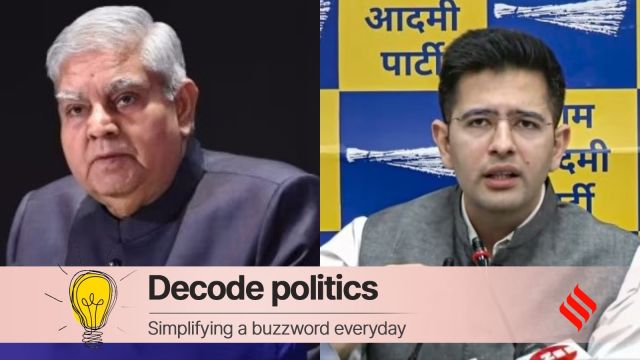Decode Politics: Dhankhar refuses to appoint Raghav Chadha AAP’s interim leader in Rajya Sabha — what the rules say
AAP says the Rajya Sabha chairperson has not dismissed its plea and that the Upper House secretariat has only sought clarifications. But the secretariat denies this.
 On December 14, AAP national convener and Delhi Chief Minister Arvind Kejriwal wrote to V-P Jagdeep Dhankhar proposing MP Raghav Chadha’s name for the party’s interim leader. (Express file photos)
On December 14, AAP national convener and Delhi Chief Minister Arvind Kejriwal wrote to V-P Jagdeep Dhankhar proposing MP Raghav Chadha’s name for the party’s interim leader. (Express file photos)Rajya Sabha chairperson Jagdeep Dhankhar on Friday rejected the Aam Aadmi Party’s (AAP) request to appoint its MP Raghav Chadha as the interim leader of the party in the Upper House. The AAP wants Chadha to replace Sanjay Singh who is in judicial custody in the Delhi liquor scam case.
Why did Dhankhar reject the request?
On December 14, AAP national convener and Delhi Chief Minister Arvind Kejriwal wrote to Dhankhar proposing Chadha’s name for the party’s interim leader. “I would like to propose the name of Raghav Chadha as the interim party leader in the Rajya Sabha until further changes are deemed necessary. We request that this change be allowed as per the rules and procedures of the Rajya Sabha,” he wrote.
But sources in the Rajya Sabha secretariat said the request was rejected as there was no provision for the appointment of an interim leader of a party under the Leaders and Chief Whips of Recognised Parties and Groups in Parliament (Facilities) Act, 1998.
In his letter to Kejriwal, Dhankhar denied the request. “This aspect is subject to ‘The Leaders and Chief Whips of Recognised Parties and Groups in Parliament (Facilities) Act, 1998’, and the rules made thereunder. The request, not being in conformity to applicable legal regime, is not being acceded to,” wrote the Vice President.
What does the Act say?
The Act deals with facilities to be provided to leaders and chief whips of recognised parties and groups in Parliament. It defines a “recognised group” as every party that has a strength of not less than 15 members and not more than 24 members in the Rajya Sabha, and a strength of not less than 30 members and not more than 54 members in the Lok Sabha.
According to the Act, a “recognised party” must have a strength of not less than 25 members in Rajya Sabha and not less than 55 five members in Lok Sabha.
As for facilities to the leaders and chief whips of recognised groups and parties, it says, “Each leader, deputy leader and each chief whip of a recognised group and a recognised party shall be entitled to telephone and secretarial facilities.”
How has AAP responded?
While sources in the AAP claimed that the Upper House secretariat had asked for some clarifications, to which it will respond, sources in the secretariat said it had sought no clarifications.
AAP sources, however, maintain the request has not been denied but that “some corrections were sought, which will be addressed”. With Dhankhar turning down Kejriwal’s request citing rules, Sanjay Singh continues to remain the leader of the AAP in the Rajya Sabha.
- 01
- 02
- 03
- 04
- 05































